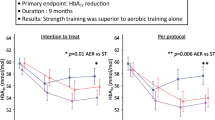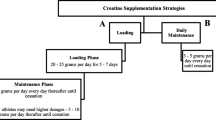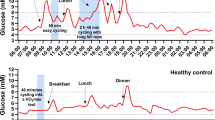Summary
Carbohydrate (CHO) ingestion during exercise, in the form of CHO-electrolyte beverages, leads to performance benefits during prolonged submaximal and variable intensity exercise. However, the mechanism underlying this ergogenic effect is less clear. Euglycaemia and oxidation of blood glucose at high rates late in exercise and a decreased rate of muscle glycogen utilisation (i.e. glycogen ‘sparing’) have been proposed as possible mechanisms underlying the ergogenic effect of CHO ingestion. The prevalence of one or the other mechanism depends on factors such as the type and intensity of exercise, amount, type and timing of CHO ingestion, and pre-exercise nutritional and training status of study participants. The type and intensity of exercise and the effect of these on blood glucose, plasma insulin and catecholamine levels, may play a major role in determining the rate of muscle glycogen utilisation when CHO is ingested during exercise. The ingestion of CHO (except fructose) at a rate of >45 g/h, accompanied by a significant increase in plasma insulin levels, could lead to decreased muscle glycogen utilisation (particularly in type I fibres) during exercise. Endurance training and alterations in pre-exercise muscle glycogen levels do not seem to affect exogenous glucose oxidation during submaximal exercise. Thus, at least during low intensity or intermittent exercise, CHO ingestion could result in reduced muscle glycogen utilisation in well trained individuals with high resting muscle glycogen levels. Further research needs to concentrate on factors that regulate glucose uptake and energy metabolism in different types of muscle fibres during exercise with and without CHO ingestion.
Similar content being viewed by others
References
Hermansen L, Hultman E, Saltin B. Muscle glycogen during prolonged severe exercise. Acta Physiol Scand 1967; 71: 129–39
Christensen EH, Hansen O. Arbeitsfähigkeit und Ernährung. Skand Arch Physiol 1939; 81: 160–75
Montain SJ, Coyle EF. The influence of graded dehydration on hyperthermia and cardiovascular drift during exercise. J Appl Physiol 1992; 73: 1340–50
Hargreaves M, Dillo P, Angus D, et al. Effect of fluid ingestion on muscle metabolism during prolonged exercise. J Appl Physiol 1996; 80: 363–6
Coyle EF, Hagberg JM, Hurley BF, et al. Carbohydrate feeding during prolonged strenuous exercise can delay fatigue. J Appl Physiol 1983; 55: 230–5
Coyle EF, Coggan AR, Hemmert MK, et al. Muscle glycogen utilisation during prolonged strenuous exercise when fed carbohydrate. J Appl Physiol 1986; 61: 165–72
Wright DA, Sherman WM, Dernbach AR. Carbohydrate feedings before, during, or in combination improve cycling endurance performance. J Appl Physiol 1991; 71: 1082–8
Tsintzas OK, Williams C, Wilson W, et al. Influence of carbohydrate supplementation early in exercise on endurance running capacity. Med Sci Sports Exerc 1996; 28: 1373–9
Hargreaves M, Costill DL, Coggan A, et al. Effect of carbohydrate feedings on muscle glycogen utilisation and exercise performance. Med Sci Sports Exerc 1984; 16: 219–22
Mitchell JB, Costill DL, Houmard JA, et al. Influence of carbohydrate dosage on exercise performance and glycogen metabolism. J Appl Physiol 1989; 67: 1843–9
Nicholas CW, Williams C, Lakomy HKA, et al. Influence of ingesting a carbohydrate-electrolyte solution on endurance capacity during intermittent, high-intensity shuttle running. J Sports Sci 1995; 13: 283–90
Millard-Stafford ML, Sparling PB, Rosskopf LB, et al. Carbohydrate-electrolyte replacement improves distance running performance in the heat. Med Sci Sports Exerc 1992; 24: 934–40
Tsintzas OK, Liu R, Williams C, et al. The effect of carbohydrate ingestion during exercise on a 30km race. Int J Sport Nutr 1993; 3: 127–39
Coggan AR, Coyle EF. Carbohydrate ingestion during prolonged exercise: effects on metabolism and performance. Exerc Sport Sci Rev 1991; 19: 1–40
Hargreaves M, Briggs CA. Effect of carbohydrate ingestion on exercise metabolism. J Appl Physiol 1988; 65: 1553–5
Erickson MA, Schwartzkopf, McKenzie RD. Effects of caffeine, fructose and glucose ingestion on muscle glycogen utilisation during exercise. Med Sci Sports Exerc 1987; 19: 579–83
Yaspelkis BI, Ivy J. Effect of carbohydrate supplements and water on exercise metabolism in the heat. J Appl Physiol 1991; 71: 680–7
Yaspelkis BI, Patterson J, Anderla P, et al. Carbohydrate supplementation spares muscle glycogen during variable intensity exercise. J Appl Physiol 1993; 75: 1477–85
Tsintzas OK, Williams C, Boobis L, et al. Carbohydrate ingestion and glycogen utilisation in different muscle fibre types in man. J Physiol 1995; 489: 243–50
Tsintzas OK, Williams C, Boobis L, et al. Carbohydrate ingestion and single muscle fibre glycogen metabolism during prolonged running in men. J Appl Physiol 1996; 81: 801–9
Davis JM, Bailey SP, Woods JA, et al. Effects of carbohydrate feedings on plasma free tryptophan and branched-chain amino acids during prolonged cycling. Eur J Appl Physiol 1992; 65: 513–9
Hermansen L, Ekblom B, Saltin B. Cardiac output during submaximal and maximal treadmill and bicycle exercise. J Appl Physiol 1970; 29: 82–6
Koyal SN, Whipp BJ, Huntsman D, et al. Ventilatory responses to the metabolic acidosis of treadmill and cycle ergometry. J Appl Physiol 1976; 40: 864–7
Derman KD, Hawley JA, Noakes TD, et al. Fuel kinetics during intense running and cycling when fed carbohydrate. Eur J Appl Physiol 1996; 74: 36–43
Bjorkman O, Sahlin K, Hagenfeldt L, et al. Influence of glucose and fructose ingestion on the capacity for long term exercise in well trained men. Clin Physiol 1984; 4: 483–94
Flynn MG, Costill DL, Hawley JA, et al. Influence of selected carbohydrate drinks on cycling performance and glycogen use. Med Sci Sports Exerc 1987; 19: 37–40
Bosch AN, Dennis SC, Noakes TD. Influence of carbohydrate ingestion on fuel substrate turnover and oxidation during prolonged exercise. J Appl Physiol 1994; 76: 2364–72
Coggan AR, Coyle EF. Reversal of fatigue during prolonged exercise by carbohydrate infusion or ingestion. J Appl Physiol 1987; 63: 2388–95
Coggan AR. Plasma glucose metabolism during exercise in humans. Sports Med 1991; 11: 102–24
Coyle EF, Hamilton MT, Alonso JG, et al. Carbohydrate metabolism during intense exercise when hyperglycemic. J Appl Physiol 1991; 70: 834–40
Bergstrom J, Hultman E. A study of glycogen metabolism during exercise in man. Scand J Clin Invest 1967; 19: 218–28
Spencer MK, Yan Z, Katz A. Carbohydrate supplementation attenuates IMP accumulation in human muscle during prolonged exercise. Am J Physiol 1991; 261 (1 Pt 1): C71–6
Maughan RJ, Fenn CE, Leiper JB. Effects of fluid, electrolyte and substrate ingestion on endurance capacity. Eur J Appl Physiol 1989; 58: 481–6
Murray R, Paul GL, Seifert JG, et al. Responses to varying rates of carbohydrate ingestion during exercise. Med Sci Sports Exerc 1991; 23: 713–8
Below PR, Rodriguez RM, Gonzalez-Alonso J, et al. Fluid and carbohydrate ingestion independently improve performance during 1h of intense exercise. Med Sci Sports Exerc 1995; 27: 200–10
Barr SI, Costill DL, Fink WJ. Fluid replacement during prolonged exercise: effects of water, saline, or no fluid. Med Sci Sports Exerc 1991; 23: 811–7
Fallowfield JL, Williams C, Booth J, et al. Effect of water ingestion on endurance capacity during prolonged running. J Sports Sci 1996; 14: 497–502
Tsintzas OK, Williams C, Singh R, et al. Influence of carbohydrate- electrolyte drinks on marathon running performance. Eur J Appl Physiol 1995; 70: 154–60
Williams C, Nute MG, Broadbank L, et al. Influence of fluid intake on endurance running performance. Eur J Appl Physiol 1990; 60: 112–9
Madsen K, Pedersen PK, Rose P, et al. Carbohydrate supercompensation and muscle glycogen utilisation during exhaustive running in highly trained athletes. Eur J Appl Physiol 1990; 61: 467–72
Fruth JM, Gisolfi CV. Effects of carbohydrate consumption on endurance performance: fructose versus glucose. In: Fox EL, editor. Nutrient utilisation during exercise. Columbus: Ross Laboratories, 1983: 68–75
Macaraeg PVJ. Influence of carbohydrate electrolyte ingestion on running endurance. In: Fox EL, editor. Nutrient utilisation during exercise. Columbus: Ross Laboratories, 1983: 91–6
Wilber RL, Moffat RJ. Influence of carbohydrate ingestion on blood glucose and performance in runners. Int J Sport Nutr 1992; 2: 317–27
Riley ML, Israel RG, Holbert D. Effect of carbohydrate ingestion on exercise endurance and metabolism after a 1-day fast. Int J Sports Med 1988; 9: 320–4
Sasaki H, Maeda J, Usui S, et al. Effect of sucrose and caffeine ingestion on performance of prolonged strenuous running. Int J Sports Med 1987; 8: 261–5
Sasaki H, Takaoka I, Ishiko T. Effects of sucrose or caffeine ingestion on running performance and biochemical responses to endurance running. Int J Sports Med 1987; 8: 203–7
Hargreaves M, Kiens B, Richter EA. Effect of increased plasma free fatty acid concentrations on muscle metabolism in exercising men. J Appl Physiol 1991; 70: 194–201
Vollestad NK, Vaage O, Hermansen L. Muscle glycogen depletion patterns in type I and subgroups of type II fibres during prolonged severe exercise in man. Acta Physiol Scand 1984; 122: 433–41
Kuipers H, Keizer HA, Brouns F, et al. Carbohydrate feeding and glycogen synthesis during exercise in man. Pflugers Arch 1987; 410: 652–6
Fielding RA, Costill DL, Fink WJ, et al. Effect of carbohydrate feeding frequencies and dosage on muscle glycogen use during exercise. Med Sci Sports Exerc 1985; 17: 472–6
Leatt PB, Jacobs I. Effect of glucose polymer ingestion on glycogen depletion during a soccer match. Can J Sports Sci 1989; 14: 112–116
Nicholas CW, Williams C, Boobis LH, et al. Effect of ingesting a carbohydrate-electrolyte beverage on muscle glycogen utilisation during high intensity, intermittent shuttle running. Clin Sci 1994; 87: 26
Dela F, Mikines KJ, Von Linstow M, et al. Effect of training on insulin-mediated glucose uptake in human muscle. Am J Physiol 1992; 263: E1134–43
Ahlborg G, Felig P. Influence of glucose ingestion on the fuelhormone response during prolonged exercise. J Appl Physiol 1976; 41: 683–8
Febbraio M, Snow R, Hargreaves M, et al. Muscle metabolism during exercise and heat stress in trained men: effect of acclimation. J Appl Physiol 1994; 76: 589–97
Yaspelkis BI, Scroop GC, Wilmore KM, et al. Carbohydrate metabolism during exercise in hot and thermoneutral environments. Int J Sports Med 1993; 14: 13–9
Murray R, Paul GL, Seifert JG, et al. The effect of glucose, fructose and sucrose ingestion during exercise. Med Sci Sports Exerc 1989; 21: 275–82
Rehrer NJ, Brouns F, Beckers E, et al. Gastric emptying with repeated drinking during running and bicycling. Int J Sports Med 1990; 11: 238–43
Felig PA, Cherif A, Minagawa A, et al. Hypoglycemia during prolonged exercise in normal men. N Engl J Med 1982; 306: 895–900
Kingwell B, McKenna MJ, Sandstrom ER, et al. Effect of glucose polymer ingestion on energy and fluid balance during exercise. J Sports Sci 1989; 7: 3–8
Chryssanthopoulos C, Williams C, Nowitz A. Carbohydrate ingestion during running and muscle glycogen utilisation in fed humans. Med Sci Sports Exerc 1995; 27: S206
Coyle EF, Coggan AR, Hemmert MK, et al. Substrate usage during prolonged exercise following a preexercise meal. J Appl Physiol 1985; 59: 429–33
Chryssanthopoulos C, Williams C, Nowitz A, et al. Comparison between carbohydrate feedings before exercise, during, or in combination on endurance running capacity. Clin Sci 1994; 87: 34
Hespel P, Richter EA. Glucose uptake and transport in contracting, perfused rat muscle with different pre-contraction glycogen concentrations. J Physiol 1990; 427: 347–59
Hargreaves M, McConell G, Proietto J. Influence of muscle glycogen on glycogenolysis and glucose uptake during exercise in humans. J Appl Physiol 1995; 78: 288–92
Bosch AN, Dennis SC, Noakes TD. Influence of carbohydrate loading on fuel substrate turnover and oxidation during prolonged exercise. J Appl Physiol 1993; 74: 1921–7
Richter EA, Galbo H. High glycogen levels enhance glycogen breakdown in isolated contracting skeletal muscle. J Appl Physiol 1986; 61: 827–31
Jeukendrup AE, Borghouts LB, Saris WH, et al. Reduced oxidation rates of ingested glucose during prolonged exercise with low endogenous CHO availability. J Appl Physiol 1996; 81: 1952–7
Coggan AR, Kohrt WM, Spina RJ, et al. Endurance training decreases plasma glucose turnover and oxidation during moderate intensity exercise in men. J Appl Physiol 1990; 68: 990–6
McConell G, Fabris S, Proietto J, et al. Effect of carbohydrate ingestion on glucose kinetics during exercise. J Appl Physiol 1994; 77: 1537–41
Jeukendrup AE, Mensink M, Saris WHM, et al. Exogenous glucose oxidation during exercise in endurance-trained and untrained subjects. J Appl Physiol 1997; 82: 835–40
Essen B, Jansson E, Henriksson J, et al. Metabolic characteristics of fibre types in human skeletal muscle. Acta Physiol Scand 1975; 95: 153–65
Essen B. Glycogen depletion of different fibre types in human skeletal muscle during intermittent and continuous exercise. Acta Physiol Scand 1978; 103: 446–55
Author information
Authors and Affiliations
Corresponding author
Rights and permissions
About this article
Cite this article
Tsintzas, K., Williams, C. Human Muscle Glycogen Metabolism During Exercise. Sports Med. 25, 7–23 (1998). https://doi.org/10.2165/00007256-199825010-00002
Published:
Issue Date:
DOI: https://doi.org/10.2165/00007256-199825010-00002




